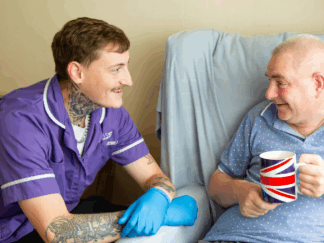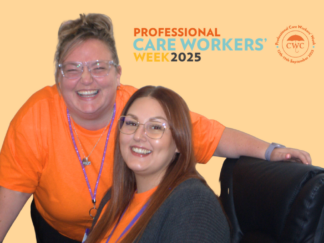
There are various feelings we have when we think about home care for a loved one. These feelings often lead to some common misconceptions about home care among both those who need the care and the relatives who may be sourcing the care.
These are the 5 misconceptions about home care.
1. Carers are unskilled
Carers come from a range of backgrounds, often as a choice to change careers later in life. These people might have been engineers, nurses, or business owners. There are also younger carers who are starting out and wish to create a career in health and social care, and students taking nursing or adult social care qualifications who need to gain real experience.
Many care workers will have done, or are progressing their health and social care qualifications. They also go through training and professional development in their role. It is important that they are always up to date with their knowledge. So, although they are not officially recognised as skilled workers, they are dedicated and trained individuals.
Some Carers are trained to perform nursing skills such as tracheostomy or catheter management.
The kind of skills a care worker has include soft skills such as:
- Empathy and compassion
- Understanding when someone needs encouragement or comforting
- Ability to deal with a health emergency
- Communication skills
- Knowing how to preserve a person’s dignity
- Supporting people with long term conditions like Alzheimer’s or Parkinson’s
2. The Carer will take over
A care plan is always completed with each individual, with family and friends involved where needed and wanted. The care planning enables the home care provider to determine healthcare needs as well as to discover more about the person, what they like, what they dislike, and what their goals and lifestyle choices are.
A care worker will align to the care plan, their job is to encourage independence and help where help is needed. You will always have choice and control over your care.
3. A stranger in the home will be uncomfortable
It is a big change and an invasion of your privacy to have a carer in your home for the first time. Carers understand these daunting feelings experienced by someone who is new to receiving home care and will be respectful of these feelings.
They’ll take great care to ensure you are comfortable with them. People usually become accustomed to their Carers fairly quickly and start to form meaningful relationships with each other.
4. Home care is expensive
Home care is less expensive than a residential care facility. Residential care can cost anything upwards of £1,200 a week. It also means that your loved one is likely to have to sell their home and most of their belongings. Moving to a strange place can be distressing.
Home care allows the person to remain in their own comfortable and familiar surroundings, and will not have to sell their home. It also makes it possible to keep any pets, and enables married couples to stay together, and remain within their own community.
Private home care can range in cost per hour. Because it is by the hour, it means you can be more flexible, increasing or decreasing support and required.
5. Home care is only needed following illness or injury
There doesn’t need to be an illness or injury for a person to take home care services. Some people receive a home care service for companionship while others choose home care because things have become more difficult due to ageing.
As home care services can be offered at times and frequencies to suit each person, it is often used at earlier stages. This can also prevent more serious things from happening; home carers are able to monitor safety in the home, as well as look out for any signs of illness.
Thinking about home care services?
Taking the step to bring in a home carer is a daunting decision, it can feel like you’re giving up on your loved one. This just simply isn’t the case, by choosing to receive at-home care you’ll be able to spend more quality time with your loved one, doing things you like to do together, whilst the everyday responsibilities are given to a trained individual to manage.
It’s a big decision and one that will need plenty of thought. If you have some questions and would like to have a no-obligation chat with a member of our team then please get in touch.
Our partners































